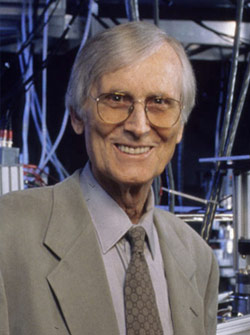Professor Martin Reiser Passes Away at 80
University of Maryland Professor Emeritus of Electrical Engineering Martin Reiser passed away peacefully at his home on Sunday, May 1, 2011, three weeks after celebrating his 80th birthday.
Throughout his long career at the University of Maryland, which began in 1965, he contributed greatly to the success of the university's vibrant research programs. Beginning with the design of the Maryland Cyclotron, he later moved on to form the Charged Particle Beam Group, and co-founded the Institute for Research in Electronics and Applied Physics. He also led the creation of the University of Maryland's applied electromagnetics and beam physics programs. Both nationally and internationally, he played a major role in establishing particle beam physics as an academic discipline, and was one of the leaders in the creation of the Beam Physics Division at the American Physical Society in the late 1980s.
"Martin played a pivotal role in establishing the University of Maryland as the research powerhouse it is today," said Prof. Patrick O'Shea, who was co-advised by Prof. Reiser as a Ph.D. student at Maryland. "Martin was also an extraordinarily accomplished educator and mentor. As a student, I remember the lucidity of his lectures, his excellent physical intuition, and the careful mentoring he gave his students. We will miss him dearly."
Reiser received his doctorate in physics in 1960 from the Johannes Gutenberg Universität in Mainz, Germany, while working as a Research Physicist at the AEG-Forschungsinstitut Frankfurt (from 1958 to 1961) on the design of the sector-focusing cyclotron for the Karlsruhe Nuclear Research Center. From 1961 to 1964, he was Assistant Professor in the Physics Department of Michigan State University, and from 1964 to 1965 he worked as a Supervisory Research Physicist at the Naval Radiological Defense Laboratory in San Francisco. In September 1965, he joined the University of Maryland as Associate Professor, with a joint appointment in the Electrical Engineering Department and the Department of Physics, and became a Full Professor in 1970. He was co-founder of the University of Maryland's Institute for Research in Electronics and Applied Physics, established in 1981.
Prof. Reiser's experimental and theoretical research was in the area of charged particle beam physics and accelerator design. His research work and interests ranged from cyclotrons and collective accelerators (in the 1960s and 1970s) to advanced accelerator applications (in recent years) in high energy physics, in the energy field (e.g., heavy-ion-driven inertial fusion), in material science, and in other areas. A major focus of the research with his graduate students and collaborators in the advanced accelerator field was the physics of space-charge dominated beams and sources of beam quality deterioration due to mismatch, lack of thermal equilibrium, nonlinear forces, instabilities, dispersion, and other effects.
Prof. Reiser was author or co-author of more than 200 research papers, co-editor of two books, and the author of the book Theory and Design of Charged Particle Beams. He was a Fellow of the American Physical Society (APS) and of the IEEE, and he served on numerous national and international committees. He served as chair of the Executive Committee of the APS Division of Physics of Beams, and of the Program Committee for the 1997 Particle Accelerator Conference in Vancouver, and president of the Washington DC Chapter of the Alexander von Humboldt Association of America.
Prof. Reiser retired in 1998 from his teaching position in the Electrical and Computer Engineering Department. He continued to work part-time with his research group in the Institute for Research in Electronics and Applied Physics as Senior Research Scientist.
Martin Reiser is survived by his wife Inge, daughter Bettina, and son Christopher.
May 2, 2011
Prev
Next
|
|


